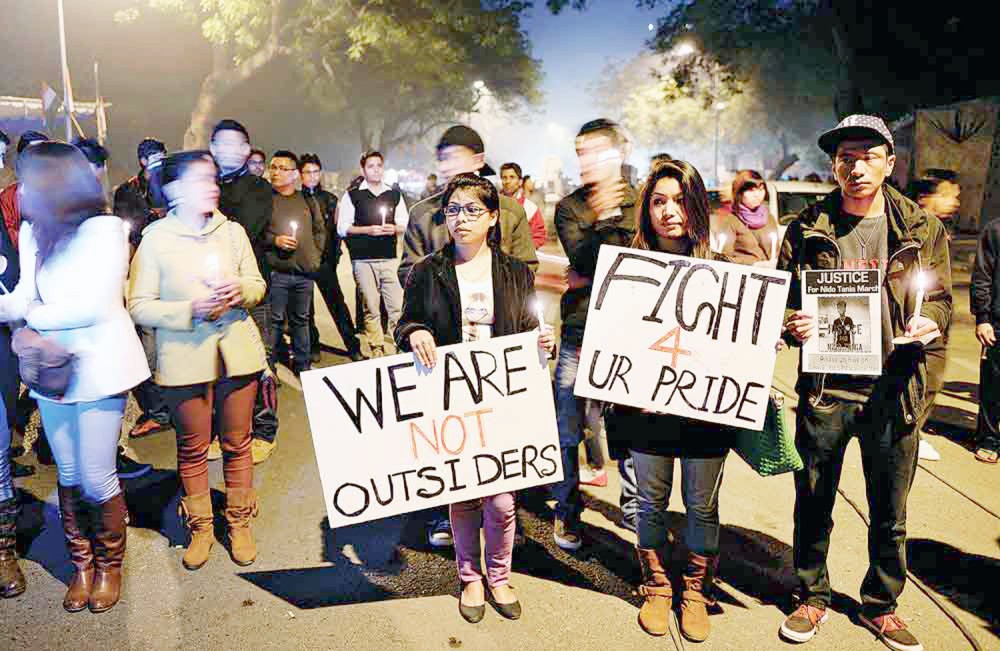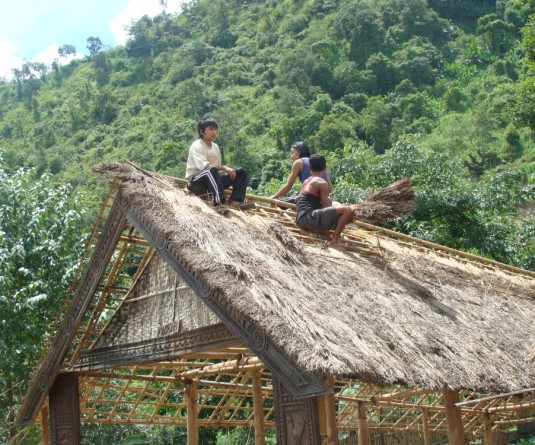People from the North East are seen protesting in New Delhi, following the assault and subsequent death of Arunuchal Pradesh student Nido Tania in January this year. AP File Photo

Cultures of knowledge and knowledge of culture need to be shared for peaceful and dignified co-existence
Arya Lakshmi
Dimapur | May 8
After the assault and subsequent death of Nido Tania in Delhi in January, 2014 the identity crisis of people from the North East has been brought to light. The much flaunted “unity in diversity” remains a mere statement as North East India falls prey to racism. In the scampered investigation into Tania’s death, the Arunachal Pradesh Chief Minister proposed to the Prime Minister of India for inclusion of North Eastern history and culture to the National Council of Education Research and Training (NCERT) syllabus.
Though many might have forgotten about it, student communities and some others have raised their voices for recognition of their cultural identity in their country.
“Are you from Japan or from China? These are some questions which sometimes makes me doubtful about my origin as an Indian. India is such a vast country and some cultural misunderstandings are ought to happen. The government should have at least mentioned a little about the existence of North Eastern states in text books so that the public is aware of their own countrymen,” said Rev. Awala Longkumer, from the Interfaith Coalition for Peace.
Racist attacks against people of the North East have proliferated throughout India. The word, ‘Chinky’, for instance, is used widely to refer to the people of the North East by not just elders and youngsters but also kids in play schools of North India. All such perceptions about people from the North East can be pointed towards the ignorance of many Indians about the latter, and also on the silence adopted by the North East states on the subject.
There have been several unions formed by students and working people from the region in metropolitan cities but their voices have gone unheard. Srijani Bhaswa Mahanta, a political science student of Lady Shri Ram College, Delhi said, “I am from Assam and I am not a chinky. The idea of separate unions is again about reinforcing these stereotypes. Changes like these in the psyche of people will take a long time to materialize. My idea to people is that, one should not take shelter in our victim status. More and more people should come out of their oppressions and make their mark.”
The said ignorance, in itself, is a shame but the fact is that a platform to learn about and understand various cultures has never been made. State educational boards of the respective states of the North East include the history of almost all states of India, along with theirs. Thereby, people in this region know about Indian history and culture while mainstream Indian cities have barely accepted these states as a part of India.
NCERT books are now planning to include the geography, history and culture of the peoples from the North East. This initiative might be good but makes it seem as though a Nido Tania incident has to occur to hit the conscience of the authorities to formulate sensitive policies.
Dr. Asangba Tzudir, Editor at Heritage Publishing House said, “The modern world is learning the hard way to accommodate differences. So-called ‘mainland’ India and North East both need to understand the sensitivity attached to ‘differences’ towards a more inclusive project of Unity in Diversity. Towards this end ‘cultures of knowledge and knowledge of culture’ need to be shared through texts, media etc towards the larger project of building a cohesive India.”
Without a doubt, much time needs to be dedicated and discussion needs to be had on which aspects of cultures of the North East are to be presented, or how.
“The (Nido Tania) incident has proved that some people do not think of us as people, but as aliens or as people infiltrating their land. The present generation can be caught young once such information on North East people is present in the NCERT text books,” said Emma Pia Khonglah, a student of Madras Christian College, Chennai. The decision might be late but for many from the North East, it is still a ray of hope to assert their identity.
Arya Lakshmi studies journalism at the Madras Christian College, and is currently an intern for The Morung Express






